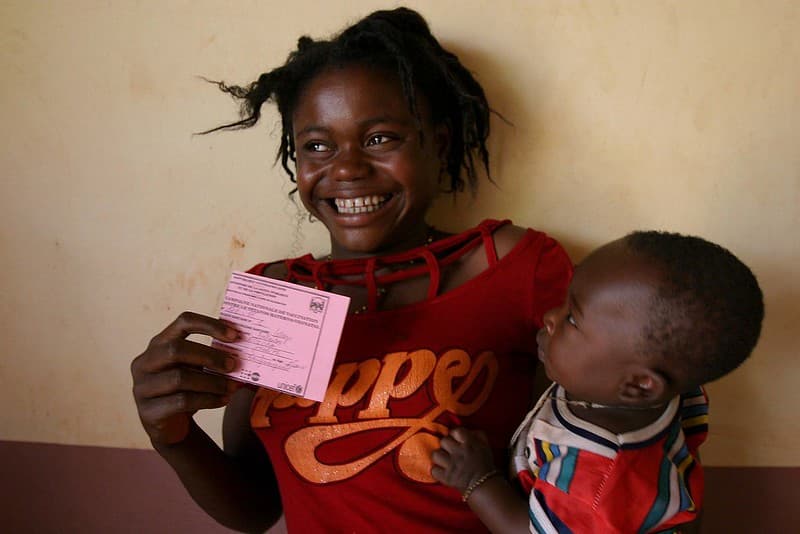National Food Safety Expert
Monrovia
- Organization: UNIDO - United Nations Industrial Development Organization
- Location: Monrovia
- Grade: Level not specified - Level not specified
-
Occupational Groups:
- Security and Safety
- Nutrition
- Food Security, Livestock and Livelihoods
- Closing Date: 2024-02-06
Requisition ID: 3368
Grade: SB5 - Local Professional (Mid-Level & Senior)
Country: Liberia
Duty Station: Monrovia
Category: National Consultant
Type of Job Posting: Internal and External
Employment Type: NonStaff-Regular
Contract Duration: 12 months
Application deadline: 06-Feb-2024, 11:59 PM (CET)
Vacancy Announcement
TEMPORARY APPOINTMENT OF PROJECT PERSONNEL
Only nationals or permanent residents of the country of the duty station are considered eligible.
Female candidates are encouraged to apply.
ORGANIZATIONAL CONTEXT
The United Nations Industrial Development Organization (UNIDO) is the specialized agency of the United Nations that promotes industrial development for poverty reduction, inclusive globalization and environmental sustainability. The mission of UNIDO, as described in the Lima Declaration adopted at the fifteenth session of the UNIDO General Conference in 2013 as well as the Abu Dhabi Declaration adopted at the eighteenth session of UNIDO General Conference in 2019, is to promote and accelerate inclusive and sustainable industrial development (ISID) in Member States. The relevance of ISID as an integrated approach to all three pillars of sustainable development is recognized by the 2030 Agenda for Sustainable Development and the related Sustainable Development Goals (SDGs), which will frame United Nations and country efforts towards sustainable development. UNIDO’s mandate is fully recognized in SDG-9, which calls to “Build resilient infrastructure, promote inclusive and sustainable industrialization and foster innovation”. The relevance of ISID, however, applies in greater or lesser extent to all SDGs. Accordingly, the Organization’s programmatic focus is structured in four strategic priorities: Creating shared prosperity; Advancing economic competitiveness; Safeguarding the environment; and Strengthening knowledge and institutions.
Each of these programmatic fields of activity contains a number of individual programmes, which are implemented in a holistic manner to achieve effective outcomes and impacts through UNIDO’s four enabling functions: (i) technical cooperation; (ii) analytical and research functions and policy advisory services; (iii) normative functions and standards and quality-related activities; and (iv) convening and partnerships for knowledge transfer, networking and industrial cooperation. Such core functions are carried out in Divisions/Offices in its Headquarters, Regional Offices and Hubs and Country Offices.
Under the overall direction of the Director General, and in close collaboration with all organizational entities within UNIDO, in particular the Office of Change Management (ODG/CHM), the Office of Legal Affairs and Compliance (ODG/LEG), the Strategic Planning and UN Engagement Division (ODG/SPU), and the Office of Evaluation and Internal Oversight (EIO), the Directorate of SDG Innovation and Economic Transformation (IET), headed by a Managing Director, is responsible for the development of innovative UNIDO services in the areas of agro-industry and agribusiness, sustainability standards and fair production, and climate-relevant or climate-improving technologies. It is also, in collaboration with ODG, responsible for developing innovative technical cooperation concepts, identifying new sources and means of finance and entering into new partnerships with a broad range of relevant stakeholders.
The Directorate houses the Divisions of Coordination and Integration Support (IET/CIS), Quality, Impact and Accountability (IET/QUA), Agribusiness and Infrastructure Development (IET/AGR), Innovative Finance and International Financial Institutions (IET/IFI), Fair Production, Sustainability Standards and Trade (IET/PST), Public-Private Partnerships (PPP), and Climate and Technology Partnerships (CTP). The Directorate also ensures close coordination and collaboration among the Divisions and relevant entities in the Directorate of Global Partnerships and External Relations (GLO) and the Directorate of Technical Cooperation and Sustainable Industrial Development (TCS).
The position is located under the Food Security and Food Systems Unit (IET/AGR/FSS) of the Division of Agribusiness and Infrastructure Development (IET/AGR).
Under the supervision of the Managing Director, Directorate of SDG Innovation and Economic Transformation (IET), and in close coordination with other organizational entities within UNIDO, the Division of Agribusiness and Infrastructure Development (IET/AGR) supports Member States in their efforts to pave the way to sustainable rural development and a structurally transformed and modernized agribusiness sector. Capitalizing on the experience gained by UNIDO in this field over decades and on tried-and-tested and to-be-developed service modules, the Division will explore innovative approaches to maximise the potential that exists in agribusiness development, addressing emerging global trends, in particular food security, poverty alleviation and climate change. It will explore new ways to contribute to global efforts to reduce hunger, accelerate food systems transition, and generate income and employment, especially among women and youth.
The Division provides technical cooperation services to assist the modernization of agriculture and agro-industry, especially in less-developed countries, ensuring that enterprises add value to primary agricultural production, substitute the imports of food and other value-added agricultural products, and participate effectively in local, regional and global value chains. Where needed, it will develop infrastructure and agro-industrial parks and capacities for agro-industrialization, value addition, quality assurance and food safety. It will also bring innovative approaches to Member States to fully benefit from carbon-neutral and biodiversity-enhancing agricultural and agro-industrial production and development opportunities in the green and blue bioeconomy.
The Food Security and Food Systems Unit (IET/AGR/FSS) promotes the development of food industries and food value chains and the production of local food products in less-developed countries to end hunger and ensure food and nutrition security while generating income and employment adhering to principles of sustainable industrial development. It provides a range of technical assistance services that allow food enterprises – including in the informal sector and especially SMEs – to extend their production, improve their products, comply with quality and other standards, become more competitive and deliver adequate and nutritious food to local populations and for export. Where opportune, it also promotes the development of food safety compliance infrastructure and building related food safety systems capacities.
PROJECT CONTEXT
More than ever food security, food supply shortages, related distribution challenges and required transformation of food systems towards enhanced resilience and sustainability are on the spotlight of the global development agenda. Due to the global poly-crisis that the world is facing – the COVID-19 pandemic, the effects of climate change, conflicts and economic downturn – the prospect for food security is gloomy.
With the underlying principle of the interdependence of food security and food safety, and in response to the challenge, the EU has identified ‘enhancing and preserving natural resources for sustainable growth’ and ‘promoting decent jobs and economic growth’ as priority area #1 and #2, respectively, in its multi-annual indicative programme for Liberia for the period 2021 – 2027.
Against the above, this food safety project has been designed within the framework of the progamme ‘From productivity to product, linking peers to peers (P2P)’, which aims at boosting safe and sustainable food systems growth for enhanced food and nutrition security, a programme that was signed between the EU and the GoL in June 2023 within the EU-Liberia Development Partnership for 2021-2027.
In line with the priorities as reflected in relevant national primary legislation, this project aims at boosting trade in and safe consumption of locally produced food by enhancing food safety practices and compliance along selected value chains (i.e. rice, fish, cassava, cocoa & coffee). It comprises a holistic range of food safety related interventions at macro, meso and micro level with a strong demand-driven approach.
Interventions at macro-level address mainly deficiencies in regard to the country’s standard-setting practices and regulatory framework, and in particular the operationalisation of the same when it comes to the existing enforcement mechanisms and related delivery of effective, risk-based inspection services. In this regard the overall performance of the national food control system is planned to be further strengthened by introducing a voluntary national 3rd party food safety assurance (vTPA) scheme that is also recognised by national competent authorities. This means that the information and data generated by an industry-/market-driven national voluntary food safety scheme, comprised of a basic food safety management scheme that private sector has to comply with, complemented by third party certification, will be considered by relevant competent authorities. It shall support them to target their official inspections to the areas of highest risk, eventually allowing for improving the usage and efficiency of already very scarce resources of the national public food control system.
In response to the need to further strengthen the required enabling institutional environment so that it is conducive to eventually boost trade of safe food, the meso-level interventions of the LIFSI are focusing on developing and implementing a voluntary national 3rd party food safety assurance scheme (i.e. practical guidelines and certification scheme) and on upgrading required testing and certification services towards accreditation accordingly. Targeted scopes will be clearly linked to the actual needs of the selected value chains and respond to the requirements of the voluntary national 3rd party food safety assurance scheme, which will be developed based on basic CODEX standards and principles. While the application of this scheme and compliance with the same by private sector actors operating along selected value chains will be supported within the micro-level component of the project, the upgrading of required and non-existing testing and certification services towards accreditation forms a critical element in strengthening the enabling institutional framework in the country. Such upgrading will focus on increasing the capacity of public entities.
The third component of the project is focusing on micro-level interventions and is addressing the need to support primary producers, processors and other relevant value chain actors to actually introduce the developed food safety scheme into their operations, as well as to increase overall awareness of food safety aspects. Having selected value chain actors being in compliance with relevant food safety requirements, and certified against the same, will eventually mean that they will benefit from increased competitiveness and market connectivity, which is at the core of the incentive mechanism of any private sector actor. At the same time, actively and substantially investing in and implementing communication campaigns addressed at consumers, producers & processors, and other relevant market actors, is aiming to enhance the overall food safety culture in the country. In applying a market-driven approach, increased awareness on the importance of food safety and food that is indeed safe for consumption, as well as knowledge on safe food handling practices and associated risks, will be essential to stimulate increased demand for, consumption of and supply of safe, locally-produced food in Liberia.
Below an overview of the project outcomes and outputs which were reconfirmed in intensive national stakeholder consultations that included representatives of relevant line Ministries, Consumer and Producer Associations, staff from the Liberian Standards Authority and its National Standards Lab, relevant UN Agencies, other complementary ongoing UNIDO projects and the EU.
Outcome 1 (MACRO level) – Enhanced efficiency of the national food control system based on an upgrade of the country’s regulatory framework and its food standard-setting functions, including through reinforcement with a voluntary national third-party food safety assurance programme.
Output 1.1 – Recommendations towards enhanced food safety regulatory oversight submitted for the selected value chains in the form of an actionable upgrading roadmap to all concerned Ministries, Authorities and Committees for endorsement and implementation.
Output 1.2 – Strengthened regulatory framework and operations, in particular in regard to food risk-based inspection services being rendered in the country, and enhanced food standard-setting functions as relevant for the selected value chains.
Outcome 2 (MESO level) – In line with the requirements of a voluntary national third-party food safety assurance scheme, the enabling institutional environment of Liberia`s food system is conducive to boost the competitiveness of primary producers and processors and to enhance overall consumer protection along the selected value and supply chains.
Output 2.1. – Based on relevant CODEX standards (e.g. Good Agricultural Practices (GAP), Good Manufacturing Practices (GMP) and Hazard Analysis Critical Control Points (HACCP) Principles), a basic, modular and voluntary national third-party food safety assurance scheme is developed, along with customised add-ons for the selected value chains and local ownership secured.
Output 2.2 – National food safety-related testing and certification services strengthened along the selected value chains towards an efficient implementation of the developed voluntary national 3rd party food safety assurance scheme (see output 2.1), and in line with international standard requirements.
Output 2.3 – The educational system in the country has been strengthened and upgraded as to facilitate in the long-term national capacity-building in the area of food safety in general, and in particular addressing the need for qualified food safety practitioners, capacitated to efficiently implement the developed scheme.
Outcome 3 (MICRO level) – Primary producers, processors and other relevant value chain actors actively pursue compliance with the developed voluntary national 3rd party food safety scheme (see outcome 2), or even advanced market requirements, and hence benefit from increased competitiveness and market connectivity, and overall advanced national food safety culture leading to enhanced demand for and supply of safe food in Liberia.
Output 3.1. – Primary producers, processors and relevant value chain actors upgraded towards compliance with the voluntary national 3rd party food safety assurance scheme, or advanced market requirements, as per clearly identified market needs and potentials.
Output 3.2 – Enhanced food safety culture and increased awareness on safe food handling practices by consumers, primary producers, food and agri-businesses and national marketplace actors (i.e. restaurants, retailers, markets, street food sellers, hotels, etc.).
FUNCTIONAL RESPONSIBILITIES
Under the day to day supervision of the CTA, overall management of the Project Manager and in close cooperation with the project team in the HQ and Monrovia, the Food Safety Expert will be responsible for the performance of the following main duties:
Main duties
Planning /design/implementation
- Oversee the planning, design, and implementation of the LIFSI food safety centered interventions, in particular all activities in regard to the regulatory framework, the food safety scheme development, the strengthening of the educational system in this field, and the enterprise compliance output.
- Provide all necessary technical inputs as to assure a timely and accurate development of consultant job descriptions, terms of reference, training arrangements, equipment specifications, etc.
- Coordinate, supervise and accompany any engagement and field mission of short-term experts who will be associated to the implementation of the concerned project activities.
Concrete/measurable - Outputs to be achieved
- Implementation maintained and goals achieved as per project document and agreed work plan.
- Comprehensive and technically sound JDs, TORs & technical specs developed.
- Consultants well integrated with other programme activities and clear about their assignments.
Monitoring & review
- Contribute to the finalisation of the M&E plan and provide inputs to the annual progress report as required.
- Concrete/measurable - Outputs to be achieved
- Concise and efficient M&E plan developed.
- Progress reports accomplished in satisfactory and timely manner.
- Capacity building of the project partners/beneficiaries
- Provide technical inputs, guidance, advisory support, and training for relevant actors.
Concrete/measurable - Outputs to be achieved
- Effective technical advice support and advisory services provided.
- Impact of capacity building activities closely monitored and advice on possible corrective action provided as needed.
Other duties as required by the PM
- Carry out ad-hoc assignments, as required.
Concrete/measurable - Outputs to be achieved
- Technical support provided as needed.
MINIMUM ORGANIZATIONAL REQUIREMENTS
Education
Advanced university degree (Master's or equivalent) in food safety, quality management, food sciences, engineering, agro-industries, business administration, economics, or other relevant discipline, is required.
Certification and trainings on food safety and quality related management standards/schemes, is desirable.
Technical and Functional Experience
- At least five (5) years of professional experience in working in the field of food safety and quality management is required.
- Experience in the implementation of technical cooperation/development projects, is desirable.
- Experience in evaluating the needs, conditions and problems of Liberia or similar country in the region is desirable.
- Experience in working with government and development agencies including the United Nations agencies in West Africa, and preferably in Liberia, is desirable.
Languages
Fluency in written and spoken English is required.
REQUIRED COMPETENCIES
Core values
WE LIVE AND ACT WITH INTEGRITY: work honestly, openly and impartially.
WE SHOW PROFESSIONALISM: work hard and competently in a committed and responsible manner.
WE RESPECT DIVERSITY: work together effectively, respectfully and inclusively, regardless of our differences in culture and perspective.
Key competencies
WE FOCUS ON PEOPLE: cooperate to fully reach our potential –and this is true for our colleagues as well as our clients. Emotional intelligence and receptiveness are vital parts of our UNIDO identity.
WE FOCUS ON RESULTS AND RESPONSIBILITIES: focus on planning, organizing and managing our work effectively and efficiently. We are responsible and accountable for achieving our results and meeting our performance standards. This accountability does not end with our colleagues and supervisors, but we also owe it to those we serve and who have trusted us to contribute to a better, safer and healthier world.
WE COMMUNICATE AND EARN TRUST: communicate effectively with one another and build an environment of trust where we can all excel in our work.
WE THINK OUTSIDE THE BOX AND INNOVATE: To stay relevant, we continuously improve, support innovation, share our knowledge and skills, and learn from one another.
This appointment is limited to the specified project(s) only and does not carry any expectation of renewal.
Employees of UNIDO are expected at all times to uphold the highest standards of integrity, professionalism and respect for diversity, both at work and outside. Only persons who fully and unconditionally commit to these values should consider applying for jobs at UNIDO.
All applications must be submitted online through the Online Recruitment System. Correspondence will be undertaken only with candidates who are being considered at an advanced phase of the selection process. Selected candidate(s) may be required to disclose to the Director General the nature and scope of financial and other personal interests and assets in respect of themselves, their spouses and dependents, under the procedures established by the Director General.
Visit the UNIDO website for details on how to apply: www.unido.org
NOTE: The Director General retains the discretion to make an appointment to this post at a lower level.
Notice to applicants:
UNIDO does not charge any application, processing, training, interviewing, testing or other fee in connection with the application or recruitment process. If you have received a solicitation for the payment of a fee, please disregard it. Vacant positions within UNIDO are advertised on the official UNIDO website. Should you have any questions concerning persons or companies claiming to be recruiting on behalf of UNIDO and requesting payment of a fee, please contact: recruitment@unido.org








